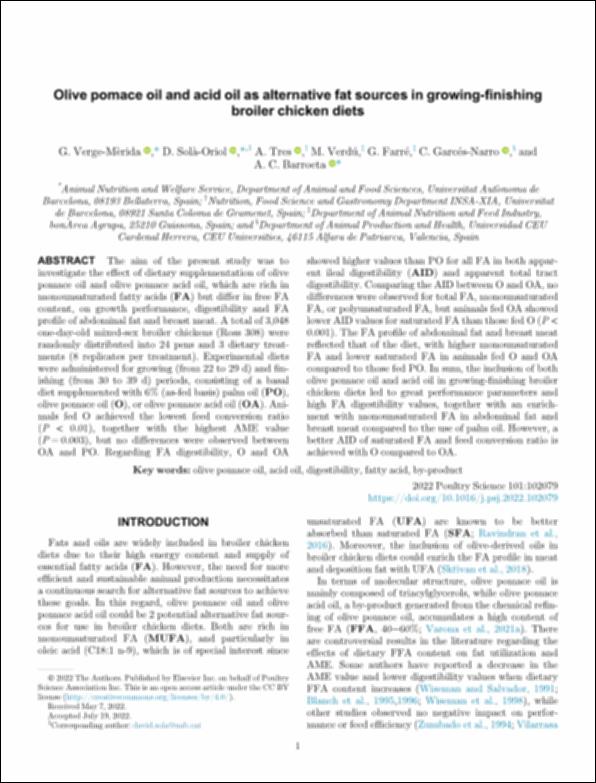Please use this identifier to cite or link to this item:
http://hdl.handle.net/10637/14438Olive pomace oil and acid oil as alternative fat sources in growing-finishing broiler chicken diets
| Title: | Olive pomace oil and acid oil as alternative fat sources in growing-finishing broiler chicken diets |
| Authors : | Verge Mèrida, Gerard Solà Oriol, David Tres, A. Verdú, Marçal Farré, G. Garcés Narro, Carlos Barroeta Lajusticia, Ana Cristina |
| Keywords: | Nutrición animal.; Pollos - Alimentación.; Chickens - Feeding and feeds.; Ácidos grasos.; Fatty acids.; Chickens - Breeding.; Dietetics (Veterinary); Alimentos para animales.; Animal feeds.; Animal nutrition.; Pollos - Cría y explotación.; Dietética veterinaria. |
| Publisher: | Elsevier |
| Citation: | Verge-Mèrida, G., Solà-Oriol, D., Tres, A., Verdú, M., Farré, G., Garcés-Narro, C. & Barroeta, A. C. (2022). Olive pomace oil and acid oil as alternative fat sources in growing-finishing broiler chicken diets. Poultry Science, vol. 101, i. 10 (oct.), art. 102079. DOI: https://doi.org/10.1016/j.psj.2022.102079 |
| Abstract: | The aim of the present study was to investigate the effect of dietary supplementation of olive pomace oil and olive pomace acid oil, which are rich in monounsaturated fatty acids (FA) but differ in free FA content, on growth performance, digestibility and FA profile of abdominal fat and breast meat. A total of 3,048 one-day-old mixed-sex broiler chickens (Ross 308) were randomly distributed into 24 pens and 3 dietary treatments (8 replicates per treatment). Experimental diets were administered for growing (from 22 to 29 d) and finishing (from 30 to 39 d) periods, consisting of a basal diet supplemented with 6% (as-fed basis) palm oil (PO), olive pomace oil (O), or olive pomace acid oil (OA). Animals fed O achieved the lowest feed conversion ratio (P < 0.01), together with the highest AME value (P = 0.003), but no differences were observed between OA and PO. Regarding FA digestibility, O and OA showed higher values than PO for all FA in both apparent ileal digestibility (AID) and apparent total tract digestibility. Comparing the AID between O and OA, no differences were observed for total FA, monounsaturated FA, or polyunsaturated FA, but animals fed OA showed lower AID values for saturated FA than those fed O (P < 0.001). The FA profile of abdominal fat and breast meat reflected that of the diet, with higher monounsaturated FA and lower saturated FA in animals fed O and OA compared to those fed PO. In sum, the inclusion of both olive pomace oil and acid oil in growing-finishing broiler chicken diets led to great performance parameters and high FA digestibility values, together with an enrichment with monounsaturated FA in abdominal fat and breast meat compared to the use of palm oil. However, a better AID of saturated FA and feed conversion ratio is achieved with O compared to OA. |
| Description: | Este artículo se encuentra disponible en la siguiente URL: https://www.sciencedirect.com/science/article/pii/S0032579122003650 |
| URI: | http://hdl.handle.net/10637/14438 |
| Rights : | http://creativecommons.org/licenses/by/4.0/deed.es |
| ISSN: | 0032-5791 1525-3171 (Electrónico) |
| Language: | es |
| Issue Date: | 15-Oct-2022 |
| Center : | Universidad Cardenal Herrera-CEU |
| Appears in Collections: | Dpto. Producción y Sanidad Animal, Salud Pública Veterinaria y Ciencia y Tecnología de los Alimentos |
Items in DSpace are protected by copyright, with all rights reserved, unless otherwise indicated.


